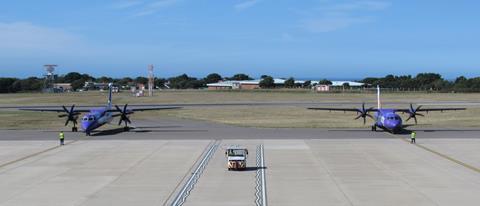Consultation on a review into the UK air passenger duty levels is now expected in “spring 2020” the country’s new chancellor Rishi Sunak disclosed today in delivering his first budget.
Sunak’s predecessor Sajid Javid had announced plans for the review in January, part of a deal struck with backers of struggling UK regional Flybe to keep the airline flying.

Javid though resigned in February, whilst backers of Flybe pulled the plug on the carrier in the early hours of 5 March, as faltering demand resulting from the coronavirus outbreak proved one blow too many for the ailing operator. The UK government came under fire from some quarters for allowing the carrier to collapse, especially given its ‘levelling up’ pledge to regional connectivity.
In delivering the budget today, Sunak provided an update of the air passenger duty review - but no firm decision.
”In January 2020 the government announced that it would undertake a review of APD ahead of the budget to ensure that regional connectivity is supported while meeting the UK’s commitment to net zero emissions by 2050,” the government said today.
”As a result, the government will consult on aviation tax reform in spring 2020. The government will consider the case for changing the APD treatment for domestic flights, such as reintroducing a return leg exemption, and for increasing the number of international distance bands.”
While the review into APD has been welcomed by industry bodies, they urged the government to do more - not least because a pre-planned inflationary rise in APD levels went ahead as part of the budget.
Mark Tanzer, chief executive of UK travel agent association ABTA, says: “While we welcome the government’s commitment to review air passenger duty in relation to domestic connectivity, we strongly urge the government to do this as part of a wider reform process, acting as the catalyst for constructive discussions between industry and government about a more comprehensive overhaul of the structure of APD.
”Furthermore we are disappointed by the inflationary increase in APD announced today, which puts the UK at an even greater competitive disadvantage compared with other countries where similar departure taxes are much lower.”
Similarly Tim Alderslade, chief executive of Airlines UK, the industry body representing UK-registered airlines, says: “The review into the impact of APD on domestic aviation and the expectation that once the Brexit transition phase is over the double whammy on regional carriers will end is welcome.
”That said, APD as a whole – across all routes – is a damaging tax and completely counter-productive to the aims of making Britain a global trading nation.
“Just as disappointing is the complete lack of support for the sector’s net zero carbon strategy. UK aviation – alone amongst any national aviation sector in the world – has committed to net zero emissions by 2050 but this will not happen without the right policy levers from Government in encouraging new technologies and innovation like sustainable aviation fuels or electric flight.”
“Aviation has been crying out for short-term support as we deal with an unprecedented crisis caused by coronavirus and the collapse of Flybe. This is the most serious period for the sector since 9/11 but questions remain as to whether this fact is understood within government,” Alderslade says.
In the past week, amid the growing impact of the coronavirusd in Europe, UK transport minister Grant Shapps has called for slot rules surrounding the 80:20 ’use it or lose it’ regulation to be eased over the summer season in order to avoid the environmental damage from “ghost flights” where airlines fly aircraft empty to retain historic slots.


























